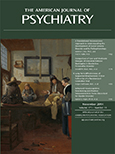The Impact of Benzodiazepine Management in the Randomized, Double-Blind Evaluation of d-Cycloserine or Alprazolam Combined With Virtual Reality Exposure Therapy
To the Editor: The study by Rothbaum et al. (1) in the June 2014 issue addressing the treatment of posttraumatic stress disorder (PTSD) in Iraq and Afghanistan war veterans may have been affected in three major ways relating to the alprazolam treatment and benzodiazepine management in general. First, the dose of alprazolam at 0.25 mg is subtherapeutic. A dose of 2 mg–3 mg is likely to have been more effective. Second, having participants discontinue their short-acting benzodiazepines 2 weeks before screening and discontinue their long-acting benzodiazepines 1 month before screening followed by a subtherapeutic dose of alprazolam is likely to have contributed to the lack of treatment effects in the alprazolam group. Third, the number of the prescreened benzodiazepine-treated individuals was not reported, nor was there a breakdown of these individuals into each study group, which could have also affected the observed treatment outcomes.
If each of these factors had been addressed, it is possible that the alprazolam group would have shown significant improvement in the d-cycloserine group.
Benzodiazepines can be a very safe and effective treatment for PTSD and all anxiety disorders and may offer substantial relief from suffering such that they should not necessarily be avoided due to excessive concerns about abuse potential. Ninety-eight percent of people taking benzodiazepines use them appropriately; 2% abuse them. This 2% also abuse alcohol and/or street drugs at the same time (2).
1 : A randomized, double-blind evaluation of D-cycloserine or alprazolam combined with virtual reality exposure therapy for posttraumatic stress disorder in Iraq and Afghanistan War veterans. Am J Psychiatry 2014; 171:640–648Link, Google Scholar
2



